Project title: Targeting serotonin metabolism in SBNETs
Po Hien Ear, PhD The University of Iowa

- Status: Completed
- Year(s): 2022
- Grant Type: Pilot
- Research Type: Basic
- Primary Tumor Site: Small Bowel
- Area of Inquiry: Tumor biology and drug sensitivity
Description
Small bowel neuroendocrine tumors (SBNETs) are the most common NETs of the gut and are highly invasive. They produce lots of serotonin, a small molecule that can induce SBNET patients to have excessive diarrhea and stiffening of the heart valves. The direct effect of serotonin on cancer cells remains understudied. Dr. Ear and her colleagues will explore blocking serotonin production in NET cells and making a tumor more sensitive to an anti-cancer drug.
What critical NET problem/question will researchers try to answer?
Serotonin may be responsible for promoting the aggressive behavior of SBNETs and making them more drug resistant and difficult to treat.
Why is this important?
The researchers found that blocking serotonin in NET cells reduces tumor growth in a mouse model and make a tumor more sensitive to another anti-cancer drug.
What will the researchers do?
Dr. Ear and her colleagues will compare SBNETs with high and low serotonin levels in mouse models and patient tumors and then identify the ways in which serotonin makes SBNET cells more resistant to anti-cancer drugs.
How might this improve treatment of NETs?
These studies will shed light into new strategies for effectively targeting SBNETs. The researchers’ data suggest that serotonin acts as a shield, allowing SBNETs to rapidly invade and protecting them from anti-cancer drugs. Removing this shield from the SBNETs may weaken the cancer to the point where it can be killed by anti-cancer drugs.
What is the next step?
Although the focus here is on SBNETs, the data generated from this project could apply to other cancers such as lung NETs, pancreas NET, colon cancer, etc. since they have been reported to make serotonin as well.
Outcomes:
Click below to watch an update from Dr. Ear:
Small bowel neuroendocrine tumors (SBNETs) are the most common cancer of the small intestine, and they are highly resistant to medical therapies. SBNET cells are very difficult to culture as a cell line and there is only 1 SBNET cell line available to researchers worldwide. This makes the drug discovery process very slow and challenging. Our group overcame this bottleneck by using patient-donated SBNET samples (from surgery) to generate SBNET spheroids for drug testing. This valuable resource allows us to dig deeper into why SBNET are so drug resistant. A unique feature of SBNETs is that they produce large quantity of serotonin, a signaling molecule that causes SBNET patients to experience excessive episodes of diarrhea per day and carcinoid heart disease. The purpose of our project was to determine the impact of serotonin on tumor growth in order to identify ways to prevent the cancer from growing. In addition, we aimed to investigate how serotonin promotes drug resistance in SBNET.
Our findings revealed that blocking serotonin in NET cells reduces tumor growth in a mouse model. When we combined blocking serotonin production and tumor growth pathway using approved therapies for NET (such as sunitinib and cabozantinib), we were able to further prevent tumor growth. Using cutting-edge chemistry techniques, we were able to show that serotonin can be attached to proteins in the SBNET cells. When cancer proteins have serotonin attached, they have more aggressive features. Our data showed SBNET cells are much more resistant to anti-cancer drugs in comparison to NET cells that originated from the pancreas. There is a correlation between the degree of drug resistance and the amount of serotonin produced by NET cells.
In conclusion, our innovative studies revealed new effective strategies to block serotonin production in SBNETs to help prevent cancer growth and control negative side effects associated with serotonin. Our data show that sunitinib or cabozantinib have additive effects with the serotonin inhibitor to maximize the blockage of tumor growth. We found that serotonin plays a dual role neuroendocrine cancer: It can circulate to other cells in the tumor neighborhood and it can be directly linked to proteins in cancer cells. This means that the cancer cell is sending serotonin to surrounding cells to synchronize their expansion/invasion. Blocking serotonin can help abolish this communication network to stop tumor growth.
Additional Details
- City: Iowa City
- State: Iowa
- Country: United States
- Grant Duration: 1 year
- Sponsor: The Carol DeBacker Charitable Trust
DISCLAIMER
NETRF funds laboratory research to understand the development of neuroendocrine tumors and translational research to explore new concepts in treatment. Research grant descriptions and research updates from NETRF are not intended to serve as medical advice. It can take years for research discoveries to be fully validated and approved for patient care. Always consult your health care providers about your treatment options.

